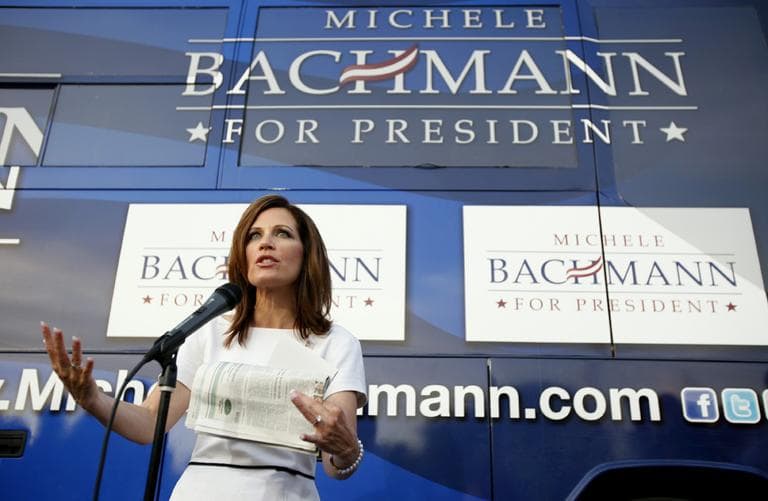Advertisement
After Ames, GOP Adjusts To New Landscape In N.H.
Resume
After a weekend that saw the race for the Republican nomination come into clearer focus, voters in New Hampshire are preparing for a new phase in the campaign that has emerged as a three-way battle between former Massachusetts Gov. Mitt Romney, Rep. Michelle Bachmann, and Texas Gov. Rick Perry.
The race took on a new dynamic following Bachmann's victory Saturday in the Ames Straw Poll in Iowa. Tea Party favorite Bachmann won the straw poll — the first voting contest in the long nomination process — over nine other candidates, including former Minnesota Gov. Tim Pawlenty.
Pawlenty, who struggled to emerge from a crowded Republican field, made winning in Ames a central peg of his campaign strategy, but dropped out of the race after finishing a disappointing third in the straw poll.
"What I brought forward, I thought, was a rational, established, credible, strong record of results" as a governor of a blue state, Pawlenty said while announcing his departure from the race on ABC "... but I think the audience, so to speak, was looking for something different."
"They’re really giving [Perry] a serious look"
Fred Thys, WBUR reporter
Pawlenty's exit, as well as Bachmann's win, was overshadowed in part by Perry's debut on Saturday. Perry enters the race as the longest serving governor in Texas history. He brings to the race strong credentials as a social conservative, and a record as a job creator that may play to voters more concerned with fiscal issues. Texas has accounted for 40 percent of the nation's new jobs since 2009, a point Perry emphasized while campaigning in Iowa on Sunday.
“At the end of the day," Perry said, “getting America working again is what the bulk of the people really care about.”
For now, however, Romney remains the man to beat in New Hampshire. In the latest WMUR Granite State Poll, 35 percent of likely Republican voters said they would vote for Romney in next year's primary. Bachmann came in second in the July poll with 12 percent of the vote, while Perry, who had yet to declare his bid at the time, collected 4 percent of the vote.
Despite his strong poll position, though, Romney has failed to garner much excitement among many New Hampshire Republicans who question how electable he is, and see President Obama's health care reform legislation as too closely modeled on the plan Romney passed as governor of Massachusetts.
And as much as New Hampshire Republicans have been lining up behind Bachmann, "they see Rick Perry as covering all the same bases that she covers, but also many more bases, like all those voters who want to fix the economy ... and so they think he's much more likely to win a general election," WBUR's Fred Thys told Radio Boston. "They're really giving him a serious look,"
Moreover, as NPR's Ron Elving blogs:
Perry’s candidacy is designed to provide an electable conservative alternative to Romney, and so he’ll need to start highlighting contrasts between his record in Texas and Romney’s in Massachusetts. Of course, Bachmann is the more immediate threat to Perry’s rise, given her pole position in Iowa. So perhaps he chooses to take her on first, before turning his attention to Romney ... If Perry fulfills expectations in fundraising and polling in the next few months, he will automatically slide into the Main Challenger role.
Guest:
- Fred Thys, WBUR reporter
More:
This segment aired on August 15, 2011.